Scottish referendum: Scotland votes 'No' to independence
- Published
- comments
Counts and celebrations: How the night unfolded
Scotland has voted to stay in the United Kingdom after voters decisively rejected independence.
With the results in from all 32 council areas, the "No" side won with 2,001,926 votes over 1,617,989 for "Yes".
Scotland's First Minister Alex Salmond called for unity and urged the unionist parties to deliver on more powers.
Prime Minister David Cameron said he was delighted the UK would remain together and that commitments on extra powers would be honoured "in full".
Mr Cameron said the three main unionist parties at Westminster would now follow through with their pledge of more powers for the Scottish Parliament.
He announced that Lord Smith of Kelvin, who led Glasgow's staging of the Commonwealth Games, would oversee the process to take forward the commitments, with new powers over tax, spending and welfare to be agreed by November, and draft legislation published by January.

Scottish referendum results in detail
The prime minister also acknowledged that the people of England, Wales and Northern Ireland must have a bigger say over their affairs.
And he promised a solution to the West Lothian question - the fact that Scottish MPs can vote on English issues at Westminster, and not the other way round.
In other developments:
US President Barack Obama welcomed Scots' decision to stay in the UK. "Through debate, discussion, and passionate yet peaceful deliberations, they reminded the world of Scotland's enormous contributions to the UK and the world," he said.
Police Scotland said Thursday's vote "passed off smoothly" with just six arrests across the country mainly for alleged breaches of the peace and assaults.
Share prices rose as Scotland voted against independence.
Polling officials said they were investigating 10 cases of suspected electoral fraud at polling stations in Glasgow.
Royal Bank of Scotland said it would keep its headquarters in Scotland following the "No" vote.
Wales's First Minister Carwyn Jones has called for more funding for his country after Scotland voted to stay in the Union.
Northern Ireland First Minister Peter Robinson said a vote on the future of Northern Ireland's border was not necessary following Scotland's 'No' vote.
Scotland rejected independence by 55% to 45%. For latest results and full coverage, go to bbc.co.uk/scotland-decides.
The result became a mathematical certainty at 06:08, as the returning officer in Fife announced a comfortable No vote.
Shortly afterwards, Mr Salmond said he accepted the defeat and called for national unity.
He told supporters: "The unionist parties made vows late in the campaign to devolve more powers to Scotland.
"Scotland will expect these to be honoured in rapid course - as a reminder, we have been promised a second reading of a Scotland Bill by March 27 next year.
The moment the No side won an unassailable lead over the Yes camp
And the first minister said: "Whatever else we can say about this referendum campaign, we have touched sections of the community who have never before been touched by politics, these sections of the community have touched us and touched the political process."
In a rallying call to his supporters, Mr Salmond urged the Yes voters to reflect on how far they had come."I don't think any of us, whenever we entered politics, would have thought such a thing to be either credible or possible," he said.
He also claimed the campaign had put "a scare and a fear of enormous proportions" at the heart of the Westminster establishment.
"Today of all days as we bring Scotland together, let us not dwell on the distance we have fallen short, let us dwell on the distance we have travelled and have confidence the movement is abroad in Scotland that will take this nation forward," he added.
Alex Salmond and David Cameron react to the result

Referendum reaction


The margin of victory for the Better Together campaign - 55% to 45% - was greater by about 3% than that anticipated by the final opinion polls. The winning total needed was 1,852,828.
Speaking in Downing Street, Mr Cameron said the result was decisive.
He said: "Now the debate has been settled for a generation, or as Alex Salmond has said: 'Perhaps for a lifetime'.
"So there can be no disputes, no re-runs; we have heard the will of the Scottish people."
The prime minister also spoke of the implications for the other nations of the UK.

What the 'No' vote means at home and abroad
.gif)
Go to the BBC's Scotland Decides page for more details

"In Wales there are proposals to give the Welsh Government and Assembly more powers and I want Wales to be at the heart of the debate on how to make the United Kingdom work for all our nations," he said.
"In Northern Ireland, we must work to ensure that the devolved institutions function effectively."
Mr Cameron said "millions of voices of England must also be heard".
"The question of English votes for English laws, the so-called West Lothian question, requires a decisive answer so just as Scotland will vote separately in the Scottish Parliament on their issues on tax, spending and welfare, so too England as well as Wales and Northern Ireland should be able to vote on these issues.
"And all this must take place in tandem with and at the same pace as the settlement for Scotland."

Constitutional revolution on the way
Analysis by Andrew Marr, author and BBC presenter
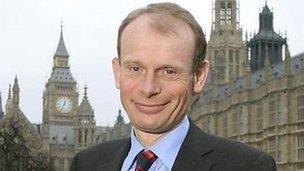
What started as a vote on whether Scotland would leave the UK has ended with an extraordinary constitutional revolution announced outside Downing Street by the Prime Minister.
It throws down the gauntlet to the Labour Party, and hints that we are going to see very big change coming and it had better come quickly.
We always used to be told that if you laid all the economists in the world end to end they still wouldn't reach a conclusion and I think that could be said often about parliamentary committees and inquiries and commissions.
Well, it can't happen this time because it's not taking place in a sealed room with the Westminster parties, the old smug consensus, getting round an argument with each other as before.
This is really taking place in a huge glass house, being watched by all the Scottish voters and by millions of people around the UK.
What the Scottish shock has done is produce a constitutional revolution on a very, very tight timetable. Possibly the most exciting political story in my lifetime.

Following his appointment by the prime minister, Lord Smith of Kelvin said he had begun work to oversee the process of delivering more powers for the Scottish Parliament.
He said: "There is an appetite for change and a strengthening of the powers for the Scottish Parliament. This is backed by all the main political parties.
"My role is to create a process through which we can channel that energy into real action.
"This won't be a drawn out process; I have started work today and will present what I hope will be unifying recommendations on 30th November."
Lord Kelvin said there would be an opportunity for "everyone to have their say".
He promised to engage with all political parties, trade unions, businesses or voluntary organisations and listen to "ideas and thoughts" from ordinary people.
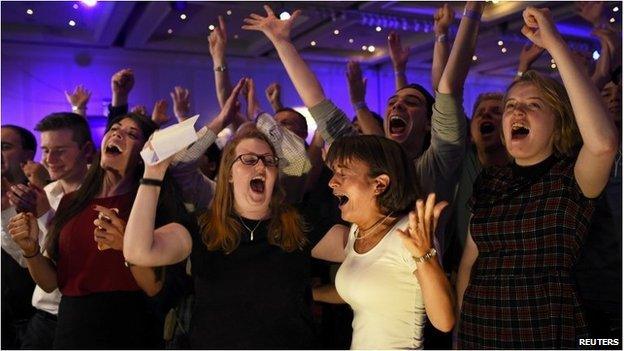
No supporters celebrate after their decisive victory
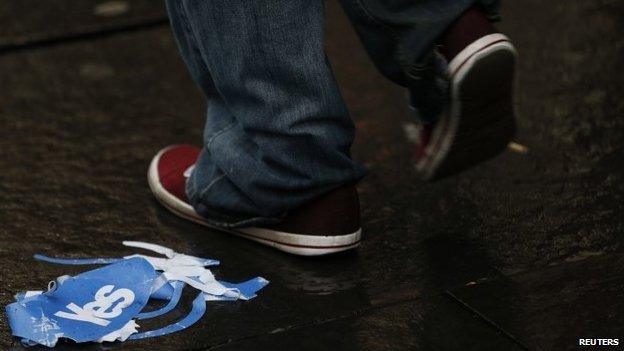
A man walks past a discarded "Yes" campaign paper hat on the Royal Mile ain Edinburgh
Alistair Darling, who led the Better Together campaign, said the people of Scotland had "chosen unity over division and positive change rather than needless separation".
"It is a momentous result for Scotland and also for the United Kingdom as a whole," he said.
Mr Darling said the result had "reaffirmed all that we have in common and the bonds that tie us together", adding: "Let them never be broken."
"As we celebrate, let us also listen," he said.
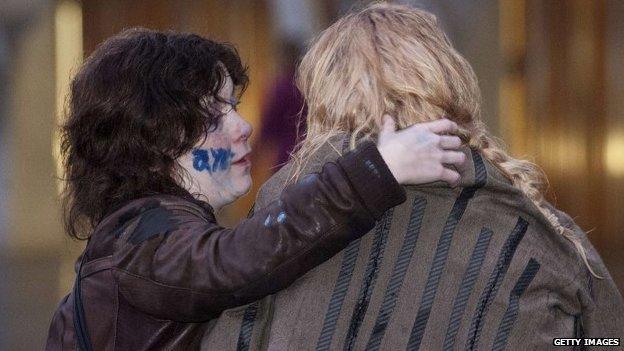
Pro-independence supporters console one another in Edinburgh
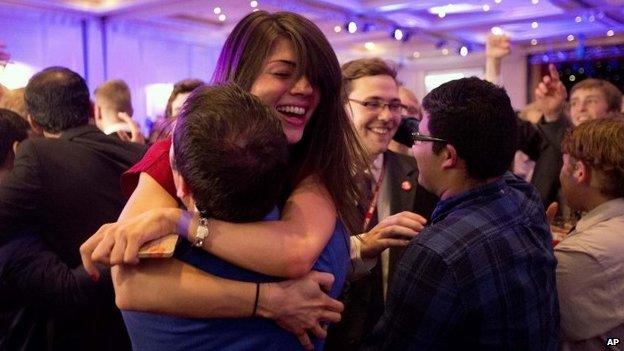
"No" campaigners were jubilant as the scale of the result became known
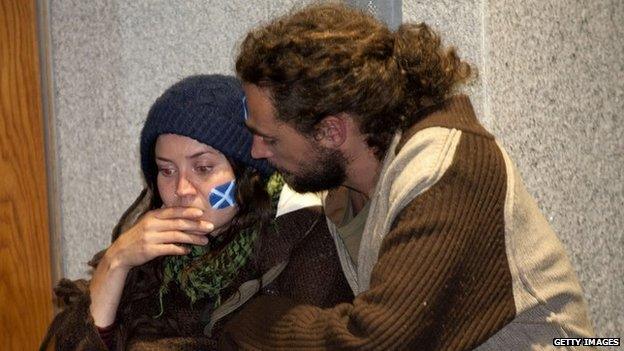
Many "Yes" supporters were visibly upset by the result
Across Scotland, the "No" vote had a majority in 28 of the country's 32 local authority areas.
Dundee was the first area to back independence. On a turnout of 78.8%, "Yes" polled 53,620 votes to the "No" campaign's 39,880.
The other three areas were all clustered in Labour's traditional west of Scotland heartland.
Glasgow, Scotland's largest council area and the third largest city in Britain, voted in favour of independence by 194,779 to 169,347, although turnout was lower than in other areas at 75%.
West Dunbartonshire also gave its backing to independence, voting 54% to 46% in favour, with North Lanarkshire completing the "Yes" quartet by 51% to 49%.
In Scotland's 28 other local authority areas, it was a night of huge disappointment for the pro-independence movement.
Hoped-for breakthroughs in other traditional Labour strongholds such as South Lanarkshire, Inverclyde and across Ayrshire never materialised.
Edinburgh, the nation's capital, clearly rejected independence by 194,638 to 123,927 votes, while Aberdeen City voted "No" by a margin of more than 20,000 votes.

Royal relief
Royal correspondent Nick Witchell at Balmoral
Balmoral seems very remote and cut off but of course the Royal Family has been following this minutely.
Reaction - one word, relief. Relief that's it's over, relief that Scotland has decided what it has.
The Queen undoubtedly, privately would have felt immense sadness had the United Kingdom been split up.
Relief too for her officials who had been starting to contemplate some very tricky constitutional issues.
Once all the politicians have said what they wish to say, I think this afternoon it is expected that the Queen will issue a short written statement.
It seems logical to surmise that after this really quite divisive campaign she will concentrate on the vote, the decision that Scotland has taken, and express the hope that Scotland will now move on.
